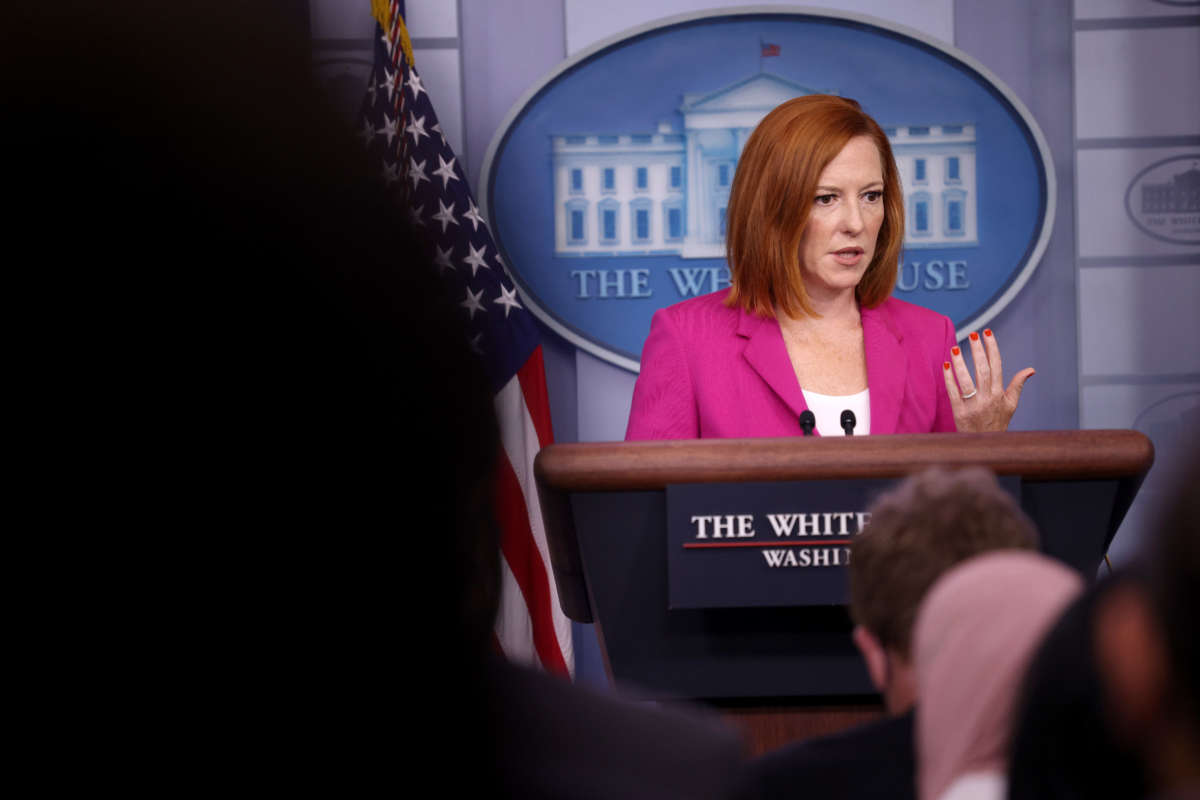Did you know that Truthout is a nonprofit and independently funded by readers like you? If you value what we do, please support our work with a donation.
The Biden White House on Wednesday rejected the World Health Organization’s call for a temporary moratorium on coronavirus booster shots, arguing that the provision of third doses for fully vaccinated people in rich countries is not in conflict with the U.N. body’s goal of urgently getting more jabs to poor nations.
“We feel that it’s a false choice and that we can do both,” White House Press Secretary Jen Psaki said during a media briefing. “We announced just yesterday that we hit an important milestone of over 110 million vaccines donated to the world. That is more than any other country has shared, combined.”
But public health advocates have warned that the Biden administration is not doing nearly enough to help close the massive inoculation gap between rich and poor nations, which is allowing deadly coronavirus variants to develop and rip through undervaccinated regions of the world, from Africa to South America to Southeast Asia.
While Psaki touted the more than 100 million Covid-19 vaccine doses the U.S. has sent overseas, Public Citizen’s Peter Maybarduk pointed out earlier this week that “100 million doses amount to only one one-hundredth of the current global need.”
“The president has said that the U.S. will serve as a vaccine arsenal for the world,” Maybarduk said in a statement Tuesday. “Ten thousand people die each day waiting for ambitious action to match this vision.”
The Biden administration is also refusing to do everything in its power to facilitate the transfer of key vaccine-making technology to overseas manufacturers that say they are prepared to begin mass-producing doses if given the opportunity. The U.S. government currently owns the patent for critical spike-protein technology developed by the National Institutes of Health — technology that has been used by at least five companies in the development of coronavirus vaccines, including Moderna, Pfizer, and Johnson & Johnson.
However, despite pressure from advocacy groups and experts — including a leading NIH scientist who helped develop the spike-protein technology — the Biden administration has thus far declined to leverage its ownership of the patent to require pharmaceutical giants to share their vaccine formulas with manufacturers in low-income countries.
President Joe Biden has also faced accusations of taking a backseat in World Trade Organization (WTO) negotiations over a temporary patent waiver for coronavirus vaccines, a proposal that has gone nowhere since Biden endorsed it in May.
Asia Russell, executive director of the advocacy group Health GAP, said last week that the Biden administration is guilty of “abetting” European nations’ ongoing obstruction of the waiver by failing to exert enough pressure on the U.S. allies.
“It is unconscionable that high-income nations of the WTO would continue to turn their backs on people of the Global South, desperate for immunity from the highly transmissible Delta variant,” said Russell.
In a speech on Wednesday, WHO Director-General Dr. Tedros Adhanom Ghebreyesus — who has embraced the patent waiver proposal — said that “we cannot accept countries that have already used most of the global supply of vaccines using even more of it, while the world’s most vulnerable people remain unprotected.”
Tedros called for a moratorium on coronavirus booster shots until at least the end of September with the goal of getting first and second shots to the billions of people around the world who currently lack access.
“Low-income countries have only been able to administer 1.5 doses for every 100 people, due to lack of supply,” Tedros said. “We need an urgent reversal, from the majority of vaccines going to high-income countries, to the majority going to low-income countries.”
The U.S. — which has wasted around a million doses since December — has not yet begun administering boosters, but last week the Biden administration bought up an additional 200 million doses of Pfizer’s Covid-19 vaccine to prepare to offer third shots to certain at-risk individuals, including the elderly and the immunocompromised.
Germany and France, meanwhile, pushed ahead with their booster-shot campaigns on Wednesday, rebuffing the WHO’s call for a moratorium. An official with Germany’s Health Ministry pointed to the country’s pledged vaccine donations to poor countries — 30 million to date — and said it can both administer third doses and help low-income countries accelerate their vaccination drives.
As around a dozen rich nations begin rolling out booster shots, around 3.5 billion people across the globe have yet to receive a single vaccine dose. Of the 4.31 billion doses administered globally thus far, just 1.1% have gone to people in low-income countries.
“The priority now must be to vaccinate those who have received no doses and protection,” Tedros said last month. “Instead of Moderna and Pfizer prioritizing the supply of vaccines as boosters to countries whose populations have relatively high coverage, we need them to go all out to channel supply to COVAX, the Africa Vaccine Acquisition Task Team, and low- and low-middle income countries, which have very low vaccine coverage.”
Speaking against the authoritarian crackdown
In the midst of a nationwide attack on civil liberties, Truthout urgently needs your help.
Journalism is a critical tool in the fight against Trump and his extremist agenda. The right wing knows this — that’s why they’ve taken over many legacy media publications.
But we won’t let truth be replaced by propaganda. As the Trump administration works to silence dissent, please support nonprofit independent journalism. Truthout is almost entirely funded by individual giving, so a one-time or monthly donation goes a long way. Click below to sustain our work.
